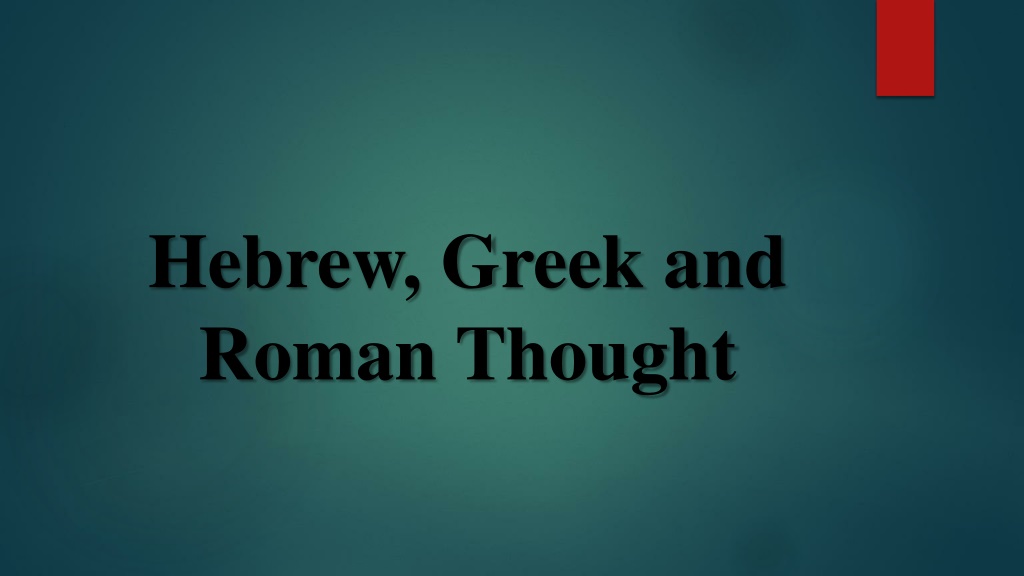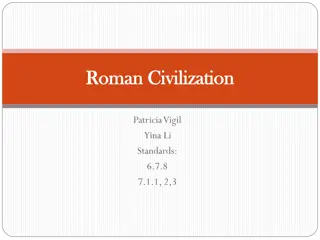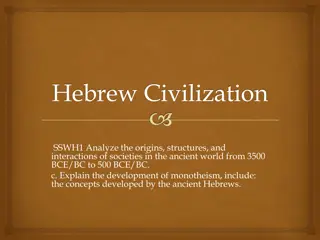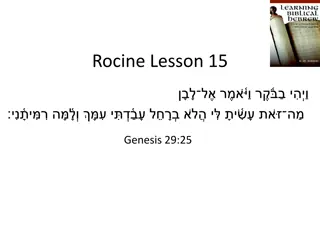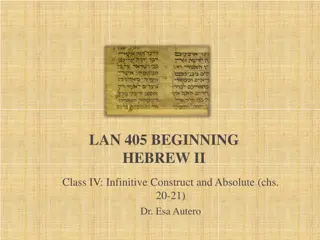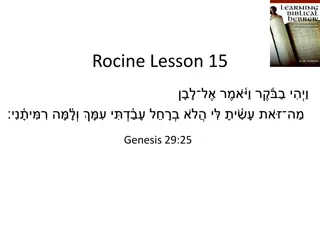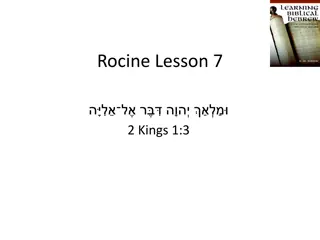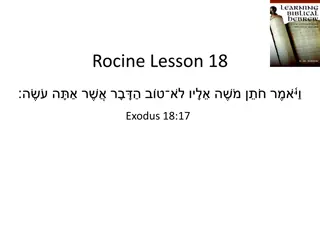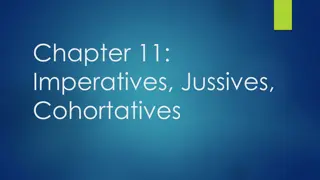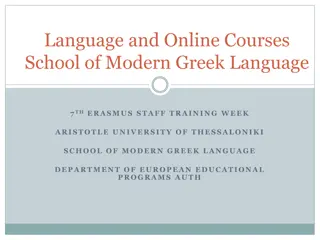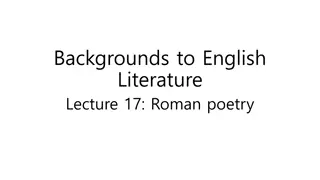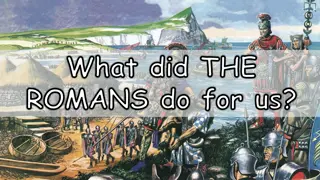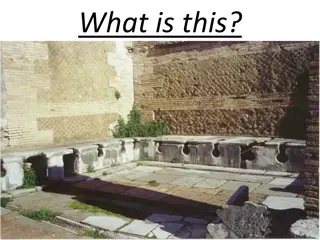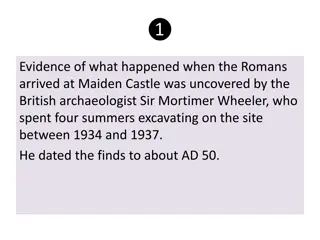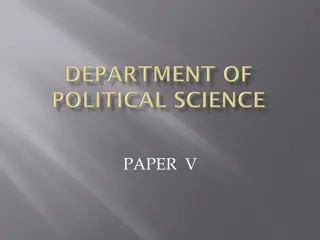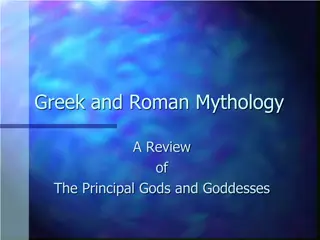Hebrew, Greek, and Roman Thought: An Overview
Hebrew civilization, with its roots dating back to 2500 B.C., intertwines various economic, political, ethical, and philosophical ideas. The Hebrews held unique beliefs on topics such as usury, commerce, labor, agriculture, and money, which shaped their societal structure and values.
Download Presentation

Please find below an Image/Link to download the presentation.
The content on the website is provided AS IS for your information and personal use only. It may not be sold, licensed, or shared on other websites without obtaining consent from the author. Download presentation by click this link. If you encounter any issues during the download, it is possible that the publisher has removed the file from their server.
E N D
Presentation Transcript
Hebrew, Greek and Roman Thought
The Hebrew Thought Hebrew civilization dates back to 2500 B.c. Main sources of information about this period are from writings of the Hebrew prophets in which they had laid down the codes of conduct and the old Testament Characteristics: economic, political, ethical and philosophical ideas were intertwined i) Ethicon-religious ideas were not conducive for economic progress because they looked down on industry (except agriculture), lack of individualism and materialism ii) They wanted to maintain social equilibrium but there was no active social planning iii)
Some important economic ideas of the Hebrews Usury (interest): Hebrew prophets condemned usury. Mosaic law prohibited usury of money, usury of victuals, usury of anything that is lent upon usury Lending on interest to strangers was allowed Hebrews were asked to show mercy in case of loans granted to poor Their thought on interest is similar to the ancient Indian thought on interest.
Commerce and Just Price Hebrew prophets set laws against false weights and measures and adulteration of articles of consumption Legislation to curb monopolistic tendencies and speculations Middleman had no place in business Export of essential food items was forbidden Hoarding was not permitted Ceiling on profit margin just price concept was developed in its primitive form
Labor Realized the dignity of labor Pride place was given to agriculture labor Payments were made in-kind Laws to safeguard interest of workers
Agriculture and Industry Rural and agrarian society Agriculture was the main occupation and they held it in high esteem Maxim: although trading gives greater profits, these may all be lost in a moment; therefore, never hesitate to buy land Agriculture basis of national life, commerce and craft were not held in esteem by the Jews
Money Hebrews understood functions of money Money was used in society described in old Testament Money used mainly in the form of bullion, ingots, or rings No stamped money Stamping of coins started in 700 B.c.
Seventh Year Hebrews left land fallow after titling it for six years to conserve the fertility of the soil Slaves freed after six years of service All debts to be cancelled
Jubilee Year This was the 50thyear Land returned to original owner 50 years later Land was the main form of wealth in those days To avoid concentration of wealth This was to prevent inequality in the wealth, to preserve family and tribal property, and to keep people attached to their country
Greek Thought Roman law and Christian religion form the basis of European culture Henry Maine except for the blind forces of nature, nothing moves in this world which is not Greek in its origin 8thcentury BC in Greece high degree of division of labor and trade Use of money was also established Society was divided into classes and ruled by landed aristocracy Slavery was an accepted part of social life Word economics is of Greek origin and it means management of the household
Plato (427-347 BC) He belonged to the city-state ofAthens Centre of democracy and individualism Anew commercial class was coming up in power Plato s dislike of Athenian democracy may be regarded as a spiritual revolt of a philosopher against extreme commercialism Main contribution division of labor and origin of city-state He was the first to offer a systematic explanation of the principles of society and of the origin of the city-state
Origin of city-state and division of labor A state arises out of the need of mankind. No one is self-sufficing but all of us have many wants City arises because of the division of labor division of labor emerged from the natural inequalities of human beings diversities of nature among us which are adapted to different occupations all things are produced more plentifully and easily, and of better quality, when one man does one thing which is natural to him and does it at the right time, and leaves other things Two thousand years later, Adam Smith used the same concept
Division of Labor Plato vs. Adam Smith Plato division of labor is the basis for social organization, city-state is built upon division of labor Adam smith division of labor is the advice for ultimate advantage Plato inequalities in human beings result in specialization Adam smith specialization results in improvement in productivity Smith causes of wealth Plato structure of society
Ideal State City-state with a constant number of citizens (5040 administratively convenient since it is divisible by all numbers upto 10) Wealth should also be stationary Ruler to be free from any motive of economic exploitation and he will accept rigorous standards of code of conduct Two classes rulers and ruled Rulers divided into guardians and auxiliaries (latter ruled artisans) Artisans engaged in menial occupations of production and exchange of wealth (they lack ability to run for government)
Ideal State Members of the ruling class will be set apart from early childhood carefully educated in philosophy and arts of war. At age 30, they will have to pass an examination. (those who pass will become the philosopher kings . Those who don t pass become soldiers Plato believed in rule by elite and they must lead a communist way of life (cannot own property, must not acquire homes or lands) Live together and share common meals, share women Rulers cannot own property so that they do not become corrupt Plato recommends communism only for upper sections, others can own property
Money, Interest and Trade Focused on medium of exchange function of money No gold and silver, only token money. So value of money is independent of the material it is made of. Foreign trade was controlled only necessities to be imported and only good not necessary to be exported Retail trade forbidden and money should not be lent on interest Did not question the institution of slavery He was a man of peace, hated war. His ideal state was Utopia Plato was the first thinker to make an economic interpretation of history
ARISTOTLE (384-322 B.C) He was an analytical economist. He was pupil of Plato and Tutor of Alexander. But he is different from Plato. The state: state like a family and the village Man is by nature is a political animal. The state is possible because all man live together in a society. The aim of state is promotion of good life His ideal state was different from Plato. Plato advocate communism Aristotle attacks the communism.
Aristotle's main contributions to economic thinking concerned the exchange of commodities and the use of money in this exchange. People's needs, he said, are moderate, but people's desires are limitless. Hence the production of commodities to satisfy needs was right and natural. whereas the production of goods in an attempt to satisfy unlimited desires was unnatural.
Economic Ideas of Aristotle Aristotle accepted that when goods are produced to be sold in a market, it can be difficult to determine if this activity is satisfying needs or inordinate desires. but he assumed that if a market exchange is in the form of barter, it is made to satisfy natural needs and no economic gain is intended. Using the medium of money, however, suggests that the objective of the exchange is monetary gain, which Aristotle condemned. One of the interesting points Aristotle made is that the problem of scarcity can be addressed by reducing consumption, by changing human attitudes. This is a powerful idea for the various Utopians and socialists who hope to end societal conflicts by eliminating the conflicts that are inherent in scarcity.
Aristotle and Private Property Aristotle was in the favor of family and private property. He recognized the justification of slavery. There was rulers and ruled, The ruler consist of military class, statesman, magistrates and priests. Private property: Private property is superior on five ground. 1.Progress 2.Peace 3.Pleasure 4.Practice 5.Philanthropy
Aristotle and Private Property Aristotle outlined the common characteristics of private property that solidified his support: 1. Private property is more productive and leads to progress. 2. Conflict is inherent in communal property management. 3. Private property is intrinsic to man s nature. The love of self, money, and property is tied to natural love of exclusive ownership. 4. Private property has existed always and everywhere. 5. Only private property allows for opportunity for moral action; to practice virtues of benevolence and philanthropy.
Private property He argue that community property will not be looked as carefully as private property. Private Property Is superior on five grounds. i. Progress: Private Property is more productive. Goods hold by large number of people receive little care. Property should be in certain sense common , but as general rule private for everyone. ii. Peace: Communal property does not give social peace. Quarrels are bound to develop, when the principle of equal wages for work does not follow.
It may possible that someone getting less wage but doing more effort. iii. Practice: The practical experience proves that private property is a good thing. The institution of communal property is not workable. iv. Pleasure: Private property will give pleasure to owner. Philanthropy: The private property promote good-will among citizen. Aristotle was against the imposition of ceiling on private property He would plead for checking the growth of population. If population is not check, then it leads to poverty which is the main reason of crime. He suggest that the private property should be combined with common use, at least among friends.
SLAVERY Aristotle view on slavery are similar to those Plato. Aristotle justify the slavery by saying that some people were slaves by nature. He regarded slavery as natural phenomenon. But in his own days some slaves were slaves not by nature but by law. The economic idea of Aristotle were as under. a)The scope of economics: The world economics is a Greek origin and literally means management of household b)According to Aristotle Economy is divided into two parts. 1.Economy Proper: The Management Of Household 2.The Science Of Supply: It Is Concern With Art Of Acquisition The Economy Proper Deals With The Development Of City State From The Village & The Household. The Science Of Supply Deals With The Needs Of The Household Are Met.
The Analysis Of Exchange Aristotle speaks two forms of exchange ; one natural and other unnatural. The natural form of exchange is merely an extension of the management of household and meant for satisfaction of men's natural wants. The unnatural form of exchange aims at monetary gains While discussing this problem, Aristotle speaks two kinds of uses one is proper use and the other is improper use The proper use is satisfaction of natural wants. The improper use occur when goods are exchanges for monetary use. E.g. shoes is use for wear, and for exchange as well.
So he said foundations of two economic concepts Value in use Value is exchange He has given the some ideas of labor, cost theory, but he was not able to state explicitly. He also give the concept of justice in prices. An exchange is just when each gets exactly as much as gives the other MONOPOLY Aristotle define monopoly as The position in a market of a single seller . He condemn it as unjust.
The Theory of Money He explain what money is and what money does . Aristotle Explain the one function of money, i.e.; medium of exchange. Aristotle explain the other function of money (store of value and measure of value) as well. Aristotle advocate a non-communist society. Naturally a society where exchange of goods and services take place. First there would be barriers, but because of double coincidence of wants, there is need of some commodity as a medium of exchange. Metals like iron and silver are good for this purpose. In the beginning , money was defined simply by size and weight. Aristotle anticipate Knapp, state Theory of money which tells that money is a creature of law. Aristotle was also aware of difference between money and wealth.
Interest Aristotle condemn interest. Money was only a medium of exchange .It has no business to increase from hand to hand. Interest is unjust. At the time of Aristotle , Money barrowed by the poorer class , for consumption purpose. The modern Theory of interest based on productive investment. He was the first analytical economist.
THE ROMAN THOUGHT Roman did not contribute much to the development of economic thought. Their ideas were borrowed from Greek They were Empire builders. Rome was a city-state with agriculture as the base of its economy. Rome are greatly influenced by the Greeks. The war results serious economic dislocation The rich become richer and poor become poorer.
DIFFERENCES BETWEEN ROMANS AND GREEKS The Romans were particularly interested in power, and much less interested in balance than the Greeks. There was one big difference. The Romans built up a vast empire: the Greeks didn t, except for the brief moment of Alexander s conquests, which soon disintegrated. The Romans were confident in their own organizational power, their military and administrative capabilities. The Greeks enjoyed an artistic and intellectual inheritance. But the Romans respected this inheritance.
Latin Literature and Architecture The native language of the Romans was Latin The Romans produced many works of poetry, comedy, tragedy, history The Architecture of Ancient Rome adopted the external Greek architecture for their own purposes, which were so different from Greek buildings. Social elements such as wealth and high population densities in cities forced the ancient Romans to discover new (architectural) solutions of their own.
ROMANS AND ECONOMICS During the time of decline of Roman empire, few of Roman give attention on Economic question. The economic topic; in Rome were discussed by Their Philosophers. The Roman regarded agriculture as most profitable, respectful and delightful occupation. They dislike luxury and believed on simplicity of life. The Roman Philosopher regarded money lending as big a crime as murder.
ROMANS [SENECA] Seneca, a Roman, Philosopher, believe money as the root of most evils, but he has pointed how trade between nations take place , out of comparative advantage. The agriculture writers have discussed the problem of employment of slave labor on farm, the size of holding, and so on. Rome are in favors of small frames. The attribute large farm , as inefficient. They regard slave labor as inefficient , and uneconomical when applied on land. Slaves did not get kind treatment , when they became too old they were sold.
ROMANS LAW The Roman law plays an important role in the history of economic analysis. Roman judges were laymen, and they have to be told what the law was. The Roman had two sets of laws.1. The civil law: (Jus civile) applied on the affairs of citizens.2. Jus Gentium: referred to the body of laws that were applicable to commercial and other relations between foreigners, or between citizen and foreigners. The Roman law based on the fact with the institutions of private property and contract. The Roman law has also provided the definitions of the concept of price , money , purchase and sale various kind of loans Their historical mission was military and political.
